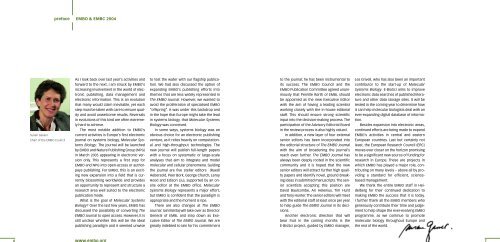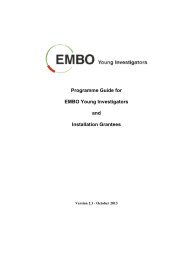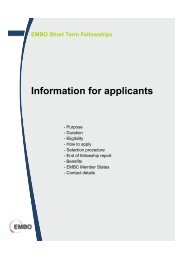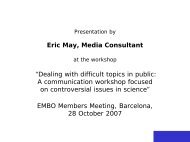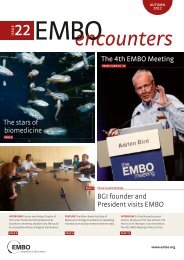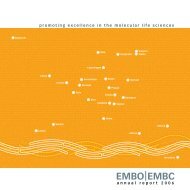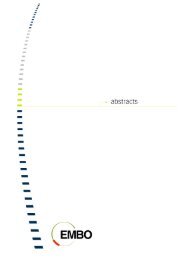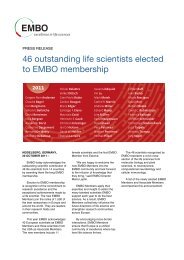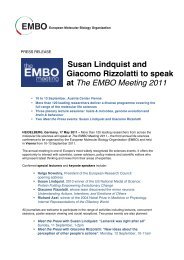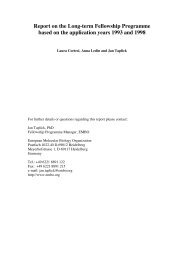EMBO Annual Report 04
EMBO Annual Report 04
EMBO Annual Report 04
You also want an ePaper? Increase the reach of your titles
YUMPU automatically turns print PDFs into web optimized ePapers that Google loves.
preface<br />
Susan Gasser<br />
Chair of the <strong>EMBO</strong> Council<br />
<strong>EMBO</strong> & EMBC 20<strong>04</strong><br />
As I look back over last year’s activities and<br />
forward to the next, I am struck by <strong>EMBO</strong>’s<br />
increasing involvement in the world of electronic<br />
publishing, data management and<br />
electronic information. This is an evolution<br />
that many would claim inevitable, yet each<br />
step must be taken with care to ensure quality<br />
and avoid unwelcome results. Reversals<br />
in evolutions of this kind are often extremely<br />
hard to achieve.<br />
The most notable addition to <strong>EMBO</strong>’s<br />
current activities is Europe’s first electronic<br />
journal on systems biology, Molecular Systems<br />
Biology. The journal will be launched<br />
by <strong>EMBO</strong> and Nature Publishing Group (NPG)<br />
in March 2005 appearing in electronic version<br />
only. This represents a first step for<br />
<strong>EMBO</strong> and NPG into open-access or authorpays<br />
publishing. For <strong>EMBO</strong>, this is an exciting<br />
new expansion into a field that is currently<br />
blossoming worldwide and provides<br />
an opportunity to represent and structure a<br />
research area well suited to the electronic<br />
publication mode.<br />
What is the goal of Molecular Systems<br />
Biology? Over the last few years, <strong>EMBO</strong> has<br />
discussed the possibility of converting The<br />
<strong>EMBO</strong> Journal to open access. However, it is<br />
still unclear whether this will be the ideal<br />
publishing paradigm and it seemed unwise<br />
www.embo.org<br />
to test the water with our flagship publication.<br />
We had also discussed the option of<br />
expanding <strong>EMBO</strong>’s publishing efforts into<br />
themes that are less widely represented in<br />
The <strong>EMBO</strong> Journal. However, we wanted to<br />
avoid the proliferation of specialised <strong>EMBO</strong><br />
“offspring”. It was under this backdrop and<br />
in the hope that Europe might take the lead<br />
in systems biology, that Molecular Systems<br />
Biology was conceived.<br />
In some ways, systems biology was an<br />
obvious choice for an electronic publishing<br />
venture, as it relies heavily on computational<br />
and high-throughput technologies. The<br />
new journal will publish full-length papers<br />
with a focus on systematic or large-scale<br />
analyses that aim to integrate and model<br />
molecular and cellular phenomena. Guiding<br />
the journal are five stellar editors (Ruedi<br />
Aebersold, Peer Bork, George Church, Leroy<br />
Hood and Edison Liu), supported by an onsite<br />
editor at the <strong>EMBO</strong> office. Molecular<br />
Systems Biology represents a major effort,<br />
but <strong>EMBO</strong> is confident that the paradigm is<br />
appropriate and the moment is ripe.<br />
There are also changes at The <strong>EMBO</strong><br />
Journal. Iain Mattaj will take over as Director<br />
General of EMBL and step down as Executive<br />
Editor of The <strong>EMBO</strong> Journal. We are<br />
greatly indebted to Iain for his commitment<br />
to the journal; he has been instrumental to<br />
its success. The <strong>EMBO</strong> Council and the<br />
<strong>EMBO</strong> Publication Committee agreed unanimously<br />
that Pernille Rørth of EMBL should<br />
be appointed as the new Executive Editor<br />
with the aim of having a leading scientist<br />
working closely with the in-house editorial<br />
staff. This should ensure strong scientific<br />
input into the decision-making process. The<br />
participation of the Advisory Editorial Board<br />
in the review process is also highly valued.<br />
In addition, a new layer of four external<br />
senior editors has been incorporated into<br />
the editorial structure of The <strong>EMBO</strong> Journal<br />
with the aim of broadening the journal’s<br />
reach even further. The <strong>EMBO</strong> Journal has<br />
always been deeply rooted in the scientific<br />
community and it is hoped that the new<br />
senior editors will attract further high quality<br />
papers and identify novel, ground-breaking<br />
ideas in submitted manuscripts.The senior<br />
scientists accepting this position are<br />
David Baulcombe, Ari Helenius, Tim Hunt<br />
and Tony Hunter.The senior editors will meet<br />
with the editorial staff at least once per year<br />
to help guide The <strong>EMBO</strong> Journal in its decisions.<br />
Another electronic direction that will<br />
bear fruit in the coming months is the<br />
E-BioSci project, guided by <strong>EMBO</strong> manager,<br />
Les Grivell, who has also been an important<br />
contributor to the start-up of Molecular<br />
Systems Biology. E-BioSci aims to improve<br />
electronic data searches of published literature<br />
and other data storage sites. It will be<br />
tested in the coming year to determine how<br />
it can help molecular biologists deal with an<br />
ever-expanding digital database of information.<br />
Besides expansion into electronic areas,<br />
continued efforts are being made to expand<br />
<strong>EMBO</strong>’s activities in central and eastern<br />
European countries. Last but certainly not<br />
least, the European Research Council (ERC)<br />
moves ever closer on the horizon promising<br />
to be a significant new source of funding for<br />
research in Europe. These are projects in<br />
which <strong>EMBO</strong> has played a major role, contributing<br />
on many levels – above all by providing<br />
a standard for efficient, sciencebased<br />
management.<br />
We thank the entire <strong>EMBO</strong> staff in Heidelberg<br />
for their continued dedication to<br />
making <strong>EMBO</strong> the success that it is today.<br />
I further thank all the <strong>EMBO</strong> members who<br />
generously contribute their time and judgement<br />
to help shape the ever-evolving <strong>EMBO</strong><br />
programme, as we continue to promote<br />
molecular biology throughout Europe and<br />
the rest of the world.


